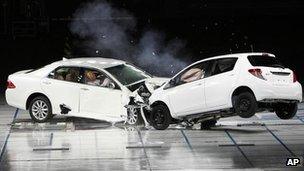Car insurance market referred to Competition Commission
- Published
- comments
Association of British Insurers' Nick Starling: "This is a great opportunity to make sure that the consumer gets the service they need"
The market for car insurance has been referred to the Competition Commission for investigation on the basis that it is not working well for motorists.
The Office of Fair Trading (OFT) made the referral because it was worried the structure of the market was making costs and premiums unnecessarily high.
It found that insurers of "at-fault" drivers had no control over the amount spent on repairs or replacement vehicles by "not-at-fault" drivers.
The Commission has two years to report.
'Higher costs'
The OFT provisionally decided in May that the market, worth an estimated £9.4bn in the UK, needed more investigation. It has reached its final decision after a public consultation process.
"Competition appears not to be working effectively in the private motor insurance market," said OFT chief executive Clive Maxwell.
"The insurers of at-fault drivers appear to have little control over the bills they must pay, and this may be leading to higher costs for them and ultimately higher premiums for motorists."
The OFT was particularly concerned that replacement vehicles being provided could be unnecessarily expensive and they could be being provided for longer than necessary.
The regulator's report earlier in the year suggested that the market was "dysfunctional".
It claimed that replacement car hire was on average £560 more expensive each time than it needed to be. Each repair was on average £155 more expensive as well.
The insurers do this in return for a lucrative fee from the car hire firm or garage involved.
The report said that such practices were pushing up total premiums by about £225m a year - potentially about £10 per policy.
'Serious concerns'
The Association of British Insurers (ABI) welcomed the review.

The Competition Commission has two years to report
"The OFT found what insurers have known for years - that when a customer has a crash that is their fault, their insurer has little control over the cost of the subsequent claim," said Nick Starling, the ABI's director of general insurance.
"Regulation of all players in the market to tackle excessive costs is needed, and we look forward to working with the Competition Commission to bring much needed reforms to the market that will, in turn, result in lower car insurance premiums for everyone."
However, the Credit Hire Organisation (CHO), which represents car hirers, said premiums were rising owing to an increase of whiplash claims ahead of anything else.
Martin Andrews, chief executive of the organisation, argued that giving at-fault drivers' insurers more control could mean they try to avoid ways of giving the not-at-fault driver a replacement car.
"We continue to have serious concerns as to the long-term impact it may have on the motoring consumer and their right to mobility after an accident that was not their fault," he said.
The latest investigation comes after the exposure last year of the covert system of referral fees, under which insurers, in effect, stoke up claims against themselves and thus drive up premiums.
They do this by selling details of their own policy holders' accidents to solicitors, who then encourage those drivers to sue for damages such as whiplash injury.
The Competition Commission can choose to cover all these issues in the scope of its inquiry.
- Published24 August 2011
- Published25 July 2012
- Published31 May 2012
- Published14 December 2011